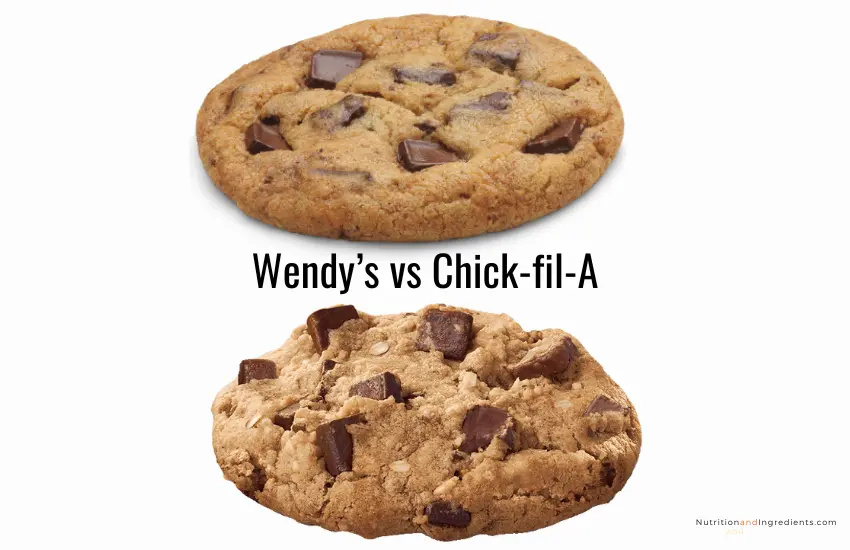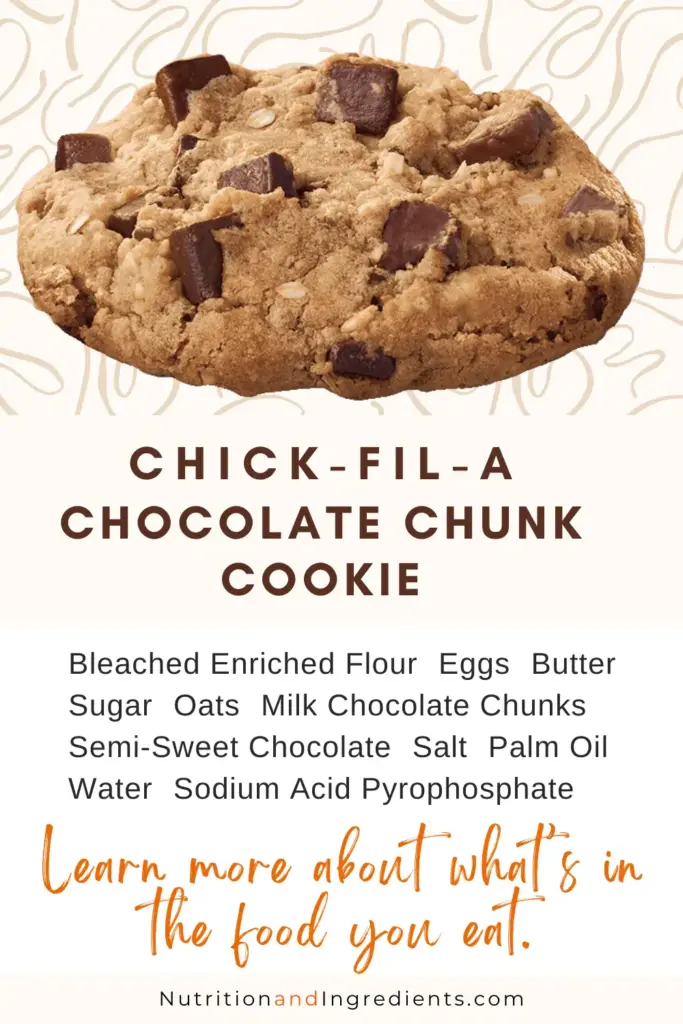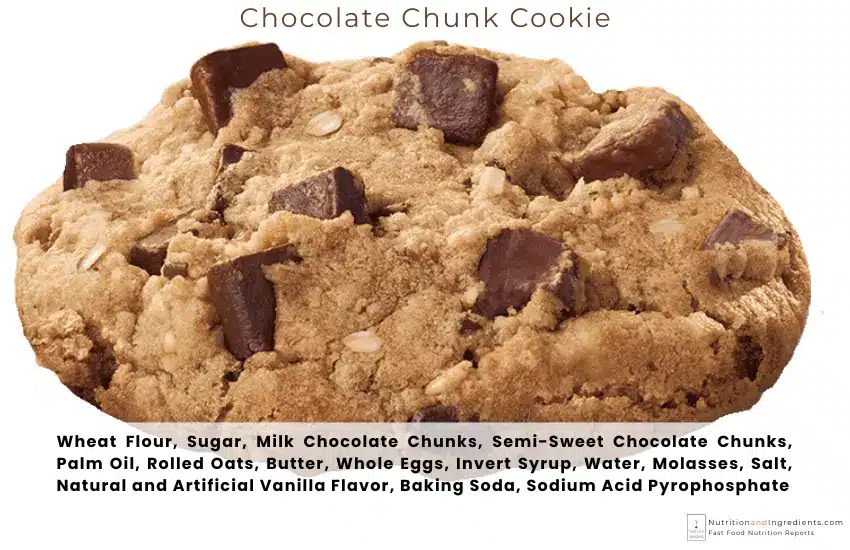Chocolate Chunk Cookies: Wendy’s vs Chick-fil-A

The best chocolate chunk cookie may have the perfect balance between a crispy exterior and a soft, chewy center. Or, maybe it’s thin and crispy cookie like those made by Tate’s Bake Shop, or thick-cut from a square sheet pan.
Needless to say, taste preferences vary as widely as the hundreds, if not thousands, of brands, sizes, and varieties of chocolate chip cookies available on the market today.
No matter. We’re not here to tout the best cookie based on flavor and texture. Rather, we provide a comparison of the nutritional value and ingredients. Our aim is to deliver information to our readers to help everyone learn more about the foods they eat.
Fast food behemoths Wendy’s and Chick-fil-A offer popular chocolate chunk cookies on their dessert menus. Let’s dig in and compare these sweet treats.
Chocolate Chunk Cookies Nutrition
When comparing the nutritional value of these cookies, they are actually quite similar. However, there are some differences and the simplest way to compare the two is with a side-by-side view.
Nutrition Facts
Review the table below, which summarizes the nutritional values in a chocolate chunk cookie from Wendy’s and from Chick-fil-A.
Amount (%DV) per Cookie
Red indicates %DV is high.
|
Per Cookie |
Wendy’s |
Chick-fil-A |
|
Calories |
330 |
370 |
|
Total Fat |
16g (21%) |
17g (22%) |
|
Saturated Fat |
8g (40%) |
9g (45%) |
|
Trans Fat |
0g |
0g |
|
Cholesterol |
20mg (7%) |
15mg (5%) |
|
Sodium |
210mg (9%) |
230mg (10%) |
|
Carbohydrates |
43g (16%) |
49g (18%) |
|
Dietary Fiber |
1g (4%) |
3g (11%) |
|
Total Sugars |
26g |
26g |
|
Protein |
3g |
5g |
%DV based on a 2,000 calorie diet. Calorie needs vary; your %DV may be higher or lower. Provided for informational purposes only. Consult with your physician for healthcare advice.
As you can see, Chick-fil-A’s version of the chocolate chunk cookie has a bit more of almost everything on the nutrition facts label.
The one exception is cholesterol. Wendy’s cookie contains 5 milligrams more dietary cholesterol per serving.

Calories
Perhaps the first and most common factor people consider when thinking about what they are going to eat is the number of calories.
Chick-fil-A’s cookie has 12% more caloriesthan Wendy’s cookie.
- Chick-fil-A chocolate chunk cookie has 370 calories
- Wendy’s chocolate chunk cookie has 330 calories
That’s due to higher amounts of fat, carbohydrates, and protein per serving.
Although total calories differ, composition of macronutrients (as a percentage of total calories) in each cookie is similar.
In both cookies, more than half of the total calories are derived from carbohydrates, which includes total sugars.
Dietary fats makes up about 44% of the 330 total calories in Wendy’s cookie and 42% of the 370 total calories in Chick-fil-A’s treat.
The following two charts illustrate this point. Total calories differ by 12%, but the amount of energy (kcalories) delivered from fat, carbs, and protein, is comparable.
% Calories from Fat, Carbs, Protein
Wendy’s Cookie: 330 calories
Dietary Fats
Amount of Fat is High
Both of these cookies have a high amount of total fat and saturated fat per serving. Specifically, Wendy’s cookie has 16 grams of total fat, including 8 grams of saturated fat.
The quantity of dietary fat in Chick-fil-A’s cookie is one gram higher: 17 grams of total fat, including 9 grams of saturated fat.
The cookies contain an amount of fat that reaches or exceeds the FDA-recommended daily value of 20%.
Calculate Daily Value
To calculate %DV, divide the amount of a nutrient in one serving by the FDA-recommended daily limit.
|
Saturated Fat |
per Cookie |
Daily Limit* |
Daily Value |
|
Wendy’s |
8g |
20g |
40% |
|
Chick-fil-A |
9g |
20g |
45% |
*Based on FDA general nutrition advice for an adult following 2,000 calorie daily diet.
Total Sugars
One serving of either chocolate chunk cookie has 26 grams of total sugars. That is significant for a single menu item.
According to the Dietary Guidelines for Americans, individuals should limit calories from added sugars to no more than 10% of total calories consumed each day.
Although neither of these quick service restaurants report added sugars separately from total sugars, the list of ingredients confirm the cookies are made with a substantial amount of added sugars.
Summary of Sugars per Cookie
Compare nutrition facts in OREO Cookies.
Daily Value (%DV) is based on a 2,000 calorie diet, the standard measure used by the FDA for general nutrition advice. Calorie needs vary. Your %DV may be higher or lower depending on height, weight, and physical activity.
Chocolate Chunk Cookies Ingredients
Cookie Ingredients
As with nearly all of the recipes for chocolate chip cookies, these two cookies contain many of the same ingredients. That said, there are a few differences.
Wendy’s cookie is made with only ten main ingredients while Chick-fil-A uses over a dozen. Use the following table, which lists the ingredients in each cookie, to compare.
| INGREDIENT | WENDY’S | CHICK-FIL-A |
|---|---|---|
| Enriched Bleached Flour | Yes | Yes |
| Sugar | Yes | Yes |
| Semi-Sweet Chocolate | Yes | Yes |
| Palm Oil | Yes | Yes |
| Milk Chocolate | — | Yes |
| Oats | — | Yes |
| Eggs | Yes | Yes |
| Molasses | Yes | Yes |
| Butter | Yes | Yes |
| Invert Sugar | — | Yes |
| Baking Soda | Yes | Yes |
| Water | — | Yes |
| Salt | Yes | Yes |
| Natural Flavor | Yes | Yes |
| Sodium Acid Pyrophosphate | — | Yes |
| Artificial Flavor | — | Yes |

The cookies contain a significant amount of sugars, most of which we assume to be added sugars. By comparison, natural sugars are found organically in foods such as vegetables and fruit.
What’s notable is that in addition to sugar, which is the second ingredient in Chick-fil-A’s treat, the batter also includes invert sugar and molasses. Moreover, sugar is the first ingredient listed in both the semi-sweet chocolate and the milk chocolate.
Nutritional information and ingredients in this guide is based on information provided by Wendy’s and Chick-fil-A.
Which Cookie Do You Choose?
So, which chocolate chunk cookie do you choose?
Does knowing that there are fewer ingredients and fewer calories in Wendy’s dessert option sway your decision, or does it all come back to taste?
Even if it’s the latter and your choice is solely dependent on flavor, we recommend taking the nutritional content of these cookies into account as you make choices about which foods to eat throughout the rest of the day.

Compare nutrition facts in Pepperidge Farm Chocolate Chunk Cookie.
Nutrition facts, prices, and ingredients are based on available information as of the date of publication. Restaurants and food manufacturers may change recipes or formulations without notice. Check package labels and ask the product manufacturer or restaurant for the most up-to-date information. Unless otherwise stated, %DV is based on a 2,000 calorie diet. All reports and reviews published on this site are for informational purposes only. NutritionandIngredients.com does not provide healthcare advice or dietary recommendations. Always consult your licensed physician for any healthcare or dietary advice.
Cookie images courtesy of Wendy’s and Chick-fil-A. Original designs by Nutrition & Ingredients for research and commentary related to fast food nutrition.
